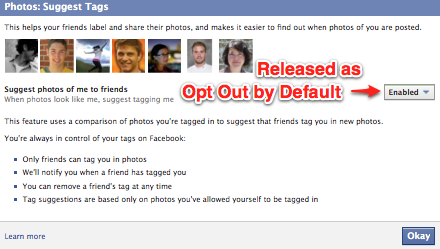Facebook has reached an agreement with the FTC to make all future changes to privacy settings opt-in, presumably including new features with their own privacy controls. The Wall Street Journal wrote that the social network was nearing a settlement on the issue and now its Marketplace editor Dennis K. Berman says that settlement is for new privacy controls to be opt in. The agreement could limit Facebook’s ability to drive adoption of new features, as they won’t be able to immediately go viral. Users rarely visit their privacy settings, so Facebook will need to devise a way to get them to do so.
We’ve reached Facebook’s Director of Public Policy Andrew Noyes in an attempt to confirm the settlement, but he responded saying “We’re declining to comment.”
Facebook has come under fire from the FTC and privacy advocates for a pushing users through a transition tool in December 2009 that made public some previously private information such as a user’s Likes. More recently, Facebook was criticized for enabling a facial recognition feature by default for European users. It was made opt-out rather than allowing users to decide whether they wanted their photos scanned for faces to assist them with tagging, and whether their faces would be identified in the photos uploaded by friends.
Facebook attempted to quell unrest by showing alerts on the home page directing users to check out their privacy controls. These notices apparently weren’t enough, though, and so the FTC has stepped in to prevent what it sees as future privacy violations. The changes may apply to all features, or only those impacting sharing. The latter could actually exempt features that give Facebook the power to leverage data but not necessarily share content like facial recognition.
Existing privacy settings will be left intact, but if Facebook wants to release a radically new feature that’s not covered by its existing privacy controls it will have to make it opt in. It will also need opt ins to retroactively change settings applied to previously shared content, such as taking a type of biographical information and changing it to be public. It look like Facebook will also be subject to privacy audits from the FTC for the next 20 years.
Facebook has been known for rapidly evolving its product with a fail fast attitude. Changes are often met with resistance. Sometimes users grow to love them, sometimes Facebook responds by scrapping or modifying them. The agreement with the FTC could slow down this evolution of the service. Facebook will have to carefully weigh whether it’s worth it to add or change something if it has to get approval from each of its 800 million users.

